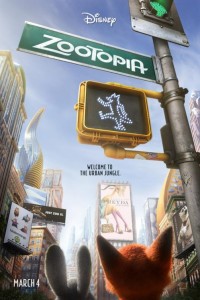Dark Animation: Zootopia

In the last couple of years, Disney has tried reaching out to new themes that appeal to older audiences as well as young ones, and their latest film “Zootopia” does this in a very unique way.
The story’s set-up is fairly simple: In a world where humans never existed, animals evolved into sentience and a modern-day society that centers around the metropolis city Zootopia.
A young rabbit named Judy Hopps, voiced by Ginnifer Goodwin, dreams of becoming the first rabbit police officer and does just that. However, the dream is not quite what she expected as all her fellow police officers tend to look down on her for being a rabbit, rather than a big, intimidating predator.
She takes a shot on the case of a missing mammal with some help from a con artist fox named Nick Wilde, voiced by Jason Bateman. The two end up uncovering an underground plan that sends Zootopia into a chaos that our society is not entirely unfamiliar with, and need to work to set things right again.
The film was made by Disney Animation Studios, directed by Byron Howard and Rich Moore. Howard worked as an animator on other Disney hits such as “Lilo and Stitch,” “Pocahontas,” “Mulan,” “Brother Bear,” and “Tangled.”
Moore worked as a director for some episodes of famous TV series such as “The Simpsons,” “Futurama” and the movie “Wreck-It-Ralph.” Both of these two directors clearly have the resume to back up their work, as well as the other five writers that worked together to help make this film in the five-year process since their first pitch to Disney.
In the story, the writers never intended for the movie to be a “Message Film” as some people are taking it. There are strong themes of discrimination in scenes reminiscent to that of the Black Lives Matter protests.
Animals stand up, peacefully protesting with their own signs to say that the predators that the public fears because of recent events are not inherently dangerous because they are predators. You hear heart-breaking comments and slurs like, “Go back to your own territory!” Only for the movie to show that the predator is a Zootopia native.
These scenes help to make the world much more relatable to the contemporary audience, and offer its own look on the chaos that one might see in modern-day racism.
However, Moore stated that it was not their intention to make a message movie, but rather a movie with “layers” as he stated in an interview with CBS’s KUTV to help appeal more to the contemporary audience since more kids are becoming aware of their surroundings and their environment and know of the turmoils that are happening in their own backyards.
With Zootopia, it is not about the discrimination of predator and prey, but rather about the story of Judy Hopps as she pursues her dream in an unfamiliar city. “It’s this very appealing character,” Moore said in his interview.
“With huge determination and aspirations, [she] finds that the world doesn’t work exactly how she thinks. You know, and not only does she learn a lot about the world over the course of the story, but she learns a lot about herself and that actually helps her to get to the point where she can make the world a better place, which is what she sets out to do.”
The film has a very real message about the world that audiences can take to heart: That the world is messy, complicated, sometimes scary, and hard to figure out at times, but this doesn’t make it a bad world to be in. For upcoming seniors, this may be a very striking message to take home and perhaps help them be a little less anxious about everything that comes after graduation.
As well as the message that not everyone is the same, and not everything works in the way you might hope. At our core, we follow our emotions and fears even when they lead us to terrible ends. However, with dedication and perseverance, one can help to make things right and make their world a much better place.

